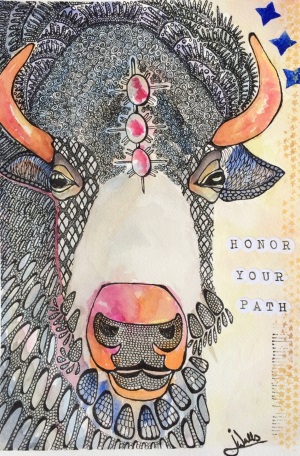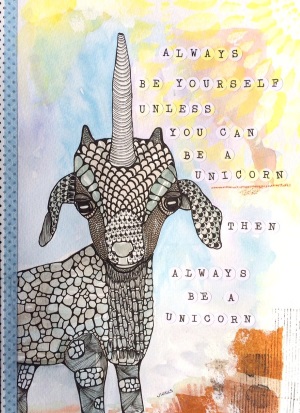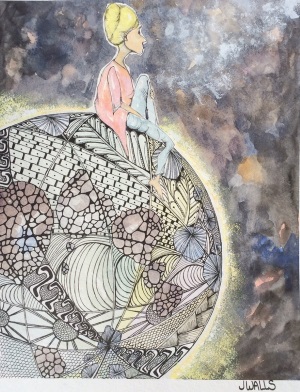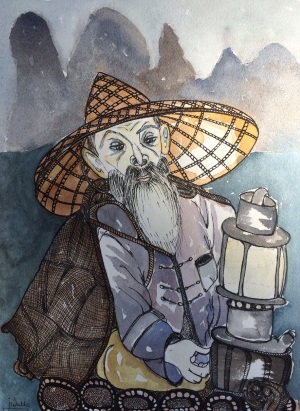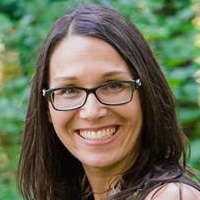Recently I had the opportunity to sit down with mixed media artist Jen Walls to talk about her transition into the world of art. Jen, a former banking industry executive who left Corporate America to raise a family, has found a way to access the joy of creating through art, and for the first time in her professional life feels truly productive and purposeful.
I’m so thankful that Jen was willing to share her thoughts with me for this blog. You’re sure to be inspired by her words if you’re someone who thinks about aligning your career with your calling, and about generally living on purpose. In this article you’ll read about:
- Discovering your calling
- Being open to synchronicity
- Becoming your own best support
- The challenges of transitioning to a new career phase
- Corporate burnout
- Whether or not following your dreams is a luxury
- Changing the world by living on purpose
Guillermo Villar: How do you know if you’re doing what you’re meant to be doing?
Jen Walls: I’ve been playing with the concept of “My job is not to judge what I’m doing, my job is just to do it and then look for the signs that tell me it’s the right thing.” So, if it’s what I feel I should be doing, I’m just going to do it to my best, and I’m not going to sit and double-think it. And then I’m going to let the Universe, or God, or people around me, tell me, “Yeah, this is what you should be doing.”
And it’s really hard to let go of that inner judgment…. in any creative field, whether it’s creating your own business, creating art, creating music, whatever, where you want to be critical. It’s your first instinct. So when you shut that up and just do your thing, you do it better because you’re not always censoring yourself and holding back on what you might’ve done.
So really I had said “yes” to doing a gallery show when I wasn’t prepared to do it, and I decided I would get ready and go all-out and do it, and the response was going to tell me whether to keep going with this particular tangent in my life. The response was overwhelming. We’re now at 60% of my work sold… It was a huge validation for me, saying… “Yeah, keep doing this.”
“I look for a lot of serendipity and a lot of synchronicity”
GV: How do you know what it is that you truly want?
JW: I tend to be in my head a lot, and I think I want to do a lot of things… So what I end up looking for opportunities presented to me, that maybe I didn’t seek… I look for a lot of serendipity and a lot of synchronicity, and maybe that’s kind of woo-hoo, but I really think we’ve lost a lot of our instinct for life, and that we need to pay attention more to those kinds of synchronicities, where you say, “Hey i think i might want to try something creative” and then someone says, “Hey, come to this art class with me”… you just start saying yes to things… when one opportunity follows another, then you feel momentum, and you’re like “OK, the universe is telling me ‘keep going this way‘”…
GV: Have you always been open to synchronicity?
JW: No, no no, no (laughs). When I left banking to stay home with the kids… I dabbled in all kinds of things… I started judging everything by whether or not it could make money. And there was no joy in any of that. No one had ever taught me, “Stop and think about what you really want to do instead of how do you make a living.”
I heard a quote recently, “Stop trying to make a living and try to make a life.” …At some point when I got frustrated with the joyless task of trying to make a living, I had the freedom and the time and the money, I started looking for “OK, what floats my boat? What makes me want to get up in the morning? What makes me excited?” Once you start looking for that, you realize you’ve squished the joy out of your own existence for most of your life, not intentionally, but you did. And it’s almost like being a kid again, you feel like you’re playing every day. And recreating that sense of play, I think, draws people to you because, who doesn’t want to play?
GV: Was there any risk for you in deciding to follow our instinct and focus on “play”?
JW: There’s a huge risk with that, because it makes you vulnerable. Instead of saying, “This is what I choose to do to make a living, this is an honored career path and viable money-making thing”, you’re saying, “This is my joy, this is my heart, this is what makes me want to get up in the morning”, and people may criticize you for that. They may put you down, they may say, “Why wouldn’t you go make money?”
“I got frustrated with the joyless task of trying to make a living”
For people who don’t chase their own joy, they’re going to try to squash you for doing that because it’s unexpected, and it’s not what they’re used to seeing from you, so they’re going to try to bring you back into the mold that they’re used to seeing you in. So there’s a huge personal vulnerability risk, and it can be unsettling.
GV: How did you overcome that vulnerability risk?
JW: It was one of those opportunities that came up… A person that had I just recently met said, “Hey, there’s this group that’s getting together doing a book called The Artist’s Way (by Julia Cameron)”…. So that turned into 12 weeks of an intense, daily writing and reading and focus on your internal dialogue, as it relates to yourself as a creative person, whether you’re an artist, whether you’re creating connections with people,whatever… That group.. has kept me focused on “What do I want?”, and blocking out “What are other people telling me?”, because those voices are not helpful…
But if it weren’t for that daily commitment to “I’m going to write 3 pages, and I’m going to focus on my own creative voice and my fears and my concerns and I’m going to allay them first thing in the morning before I get going”, that’s what made me just go all-out, every day, toward what I wanted, without the fear… It’s the self-practice of… just being aware, “Oh, I’m putting myself down because I heard someone else put me down”, or “I’m second guessing me because this person is second guessing me, now wait a minute, that’s not what my original thought was.” Without that meta-cognition… where you’re actually aware of your own thoughts, you don’t know what you’re doing to yourself every day with your own chatter.
“No one taught me, ‘Stop and think about what you really want to do'”
On the challenges of getting support as you transition into a new phase
JW: There’s a transition point where your former support group who is questioning your new way, and might be not encouraging you, maybe you’re not leaning on them and you haven’t yet developed the new folks that you’re going to lean on. And there’s a temptation to abandon your path there.
However, if you’re paying attention to yourself every day and nurturing yourself and being your own support group, then you can get through that time and say, “OK, what are these people giving to me right now (the naysayers), or are they only taking away my energy?” If they are giving me energy and launching me, then I’m going to keep them close, and if they’re not, I’m going to maybe hold them at arm’s length until I feel strong enough that I can handle that without falling back.
And that’s one of the things you analyze in that daily writing is, “Who do I feel safe sharing my dreams with, until I feel rock solid in my dreams?” And maybe you limit (your sharing) to those people…
For example, in my new path, the least amount of support I’ve received has been from the majority of my own family. I value their wisdom, they’re very smart people… So if they’re… maybe not saying anything negative, but not encouraging me in the way that they would have if I were seeking the presidency of a bank, or something… Their silence speaks volumes.
However, I think maybe this is what was missing in past career paths for me, is not starting from the point of self-knowledge. So letting the peer group decide what you do, instead of you deciding what you do… But when it’s just you standing on the mountain by yourself saying, “Yeah, I want this”, well that’s a rock solid place to start.
“When it’s just you standing on the mountain… that’s a rock solid place to start”
GV: How do you become your own support?
JW: You have to think of yourself as a person separate from yourself. This is going to sound really strange, but you have to parent yourself, you have to friend yourself, you have to nurture yourself. So, instead of thinking, “What do I have to do today?”, you think, “What do I need to do for me today so that I feel confident, so that I feel capable, so that I feel brave?”, and then pat yourself on the back. You’re going to give yourself small, attainable steps you can take every day. And I would do that in my morning writings, “What steps can I take today that I feel brave enough to take, even if they’re small ones, so that I’m always moving forward?” And then the next day I would reflect, “What steps did I take, how did they work out, what can I do today?
And I would just keep that momentum of positive self-talk and pats on the back going. And once you start doing that, you realize you don’t really need other people’s approval so much, and you stop people-pleasing and you start self-pleasing, not in a selfish or narcissistic kind of way, but just, you know, “Hey I’m whole all by myself.” So that way, it’s almost like a healing process…
GV: How whole are you now?
JW: Well, I think we all have a long way to go, but, I feel like a person who’s been able to access the ability and joy of creating something. I think we all need to create, whether we’re creating a wonderful poem, or whether we’re creating a business, or whether we’re creating art. And when you tap into what it is you want to build and create in the world, you feel productive and purposeful. So I don’t know if I’m whole. I’m more whole than I was, but I feel purposeful and productive in a meaningful way. Shoot, I don’t think I’ve ever had that.
GV: How do you balance what you want with other aspects of life?
JW: A lot of people will look at their passion, or their joy, or I’ll call it a calling… They will look at that as secondary, and they won’t give it the time and respect that it deserves. For me, I block out time for my calling, the same way I would block appointments I take my children to, or the day I clean the house, or the day I pay the bills, it gets blocked out on a calendar… I have an appointment with myself and my calling. So if I respect it and give it its time, then, when I’m doing the other things that you have to do in life, I don’t feel irritated, or like I’m not fulfilled in some way.
I feel like I have given myself my time, and giving them their time. You gotta give them both time, otherwise, you’re going to end up feeling grumpy, because you get cheated… Make an appointment with yourself and keep it… If you don’t take care of you, how can you give to others? You got nothing left, if you’re giving before you fuel yourself.
“When you tap into what it is you want to build and create in the world, you feel productive and purposeful”
On corporate burnout
JW: And the corporate world will not tell you that. They will say, “Give until you’re burned out and then we’ll hire someone else”… I remember when I was burned out, I was embarrassed to tell anyone. I was ashamed that I was burned out because,, “Look at the people who were still there in work. How dare I be burned out? There must be some flaw in me”, and I think that’s what you hear from the corporate culture. And until you’re away from it for some time, you don’t realize, “Hey, that was a completely dysfunctional relationship. They had me hoodwinked!”
GV: What were the drivers for you earlier in your career?
JW: I think they were fear-based, I needed financial security. I needed career stability.
GV: Why did you need those things?
JW: Lack of self-confidence. Lack of connection with what it was I really wanted. I had not daydreamed. I had not fantasized over what do I want my life to be like. I had not allowed myself that luxury because, you know, that’s lazy, that’s daydreamer, that’s unrealistic. It’s frowned upon, I think, in our culture, to be a daydreamer. But if you don’t spend time doing that, how do you know what you want? If you don’t know what you want, then you’re going to be busy trying to shelter yourself from the world and maybe from your own desires, because it can be scary to want to do something that doesn’t fit a certain mold that perhaps your family or the people around you have set.
“So, what if more people did that… It might change the world.”
GV: Is finding your calling and following your dream a luxury?
If I look back over my… path… yeah, maybe I felt able to step out because I had that luxury. But if I hadn’t had that luxury, what would’ve happened? And I look at the steps that I took and the response that happened, I think I could’ve been OK. It could’ve worked out anyway, even if I hadn’t had belt and suspenders on, because I was chasing the thing I was supposed to do, and the Universe and the people around me that I was drawing in were responding to that. So I think if you really want to do something, it won’t matter if you don’t have that belt and suspenders. You might be willing to sleep on somebody’s sofa, call in all your favors, cash in all your chips, if that’s what it takes to make it happen, and I don’t think your period of suffering or lack will be very long.
GV: Is the approach of looking inside and daydreaming for everybody? Would it be a better world if everybody did that?
JW: I can’t see how it would be a worse world. And I think there’d be a lot of people who are happier, and who are feeling and giving off better energy. Less people who are frustrated. Less people who are just earning a paycheck, and more people who are maybe drawn to whatever it is they’re doing because it’s clearly what they’re meant to do, and they’re fulfilled and they’re happy and you want some of that. You know, people… who have found their purpose and who are doing what they’re called to do, you’re kind of drawn to those people because, “Yeah, I want to feel that way.” So, what if more people did that, and what if we raised children up that way? It might change the world.
Visit Jen Wall’s website at http://jenwalls.weebly.com/

